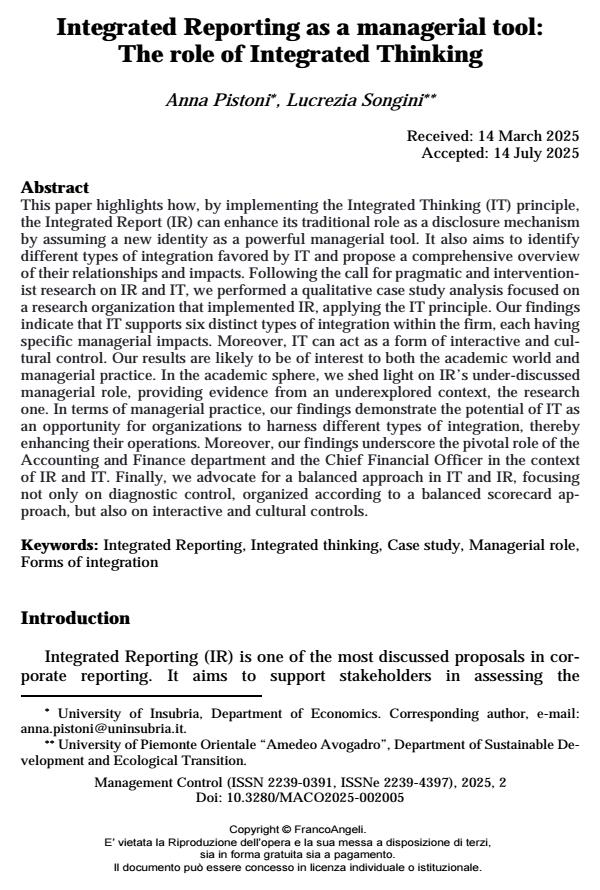Integrated Reporting as a managerial tool: The role of Integrated Thinking
Titolo Rivista MANAGEMENT CONTROL
Autori/Curatori Anna Pistoni, Lucrezia Songini
Anno di pubblicazione 2025 Fascicolo 2025/2
Lingua Inglese Numero pagine 24 P. 85-108 Dimensione file 139 KB
DOI 10.3280/MACO2025-002005
Il DOI è il codice a barre della proprietà intellettuale: per saperne di più
clicca qui
Qui sotto puoi vedere in anteprima la prima pagina di questo articolo.
Se questo articolo ti interessa, lo puoi acquistare (e scaricare in formato pdf) seguendo le facili indicazioni per acquistare il download credit. Acquista Download Credits per scaricare questo Articolo in formato PDF

FrancoAngeli è membro della Publishers International Linking Association, Inc (PILA), associazione indipendente e non profit per facilitare (attraverso i servizi tecnologici implementati da CrossRef.org) l’accesso degli studiosi ai contenuti digitali nelle pubblicazioni professionali e scientifiche.
This paper highlights how, by implementing the Integrated Thinking (IT) principle, the Integrated Report (IR) can enhance its traditional role as a disclosure mechanism by assuming a new identity as a powerful managerial tool. It also aims to identify different types of integration favored by IT and propose a comprehensive overview of their relationships and impacts. Following the call for pragmatic and interventionist research on IR and IT, we performed a qualitative case study analysis focused on a research organization that implemented IR, applying the IT principle. Our findings indicate that IT supports six distinct types of integration within the firm, each having specific managerial impacts. Moreover, IT can act as a form of interactive and cultural control. Our results are likely to be of interest to both the academic world and managerial practice. In the academic sphere, we shed light on IR’s under-discussed managerial role, providing evidence from an underexplored context, the research one. In terms of managerial practice, our findings demonstrate the potential of IT as an opportunity for organizations to harness different types of integration, thereby enhancing their operations. Moreover, our findings underscore the pivotal role of the Accounting and Finance department and the Chief Financial Officer in the context of IR and IT. Finally, we advocate for a balanced approach in IT and IR, focusing not only on diagnostic control, organized according to a balanced scorecard approach, but also on interactive and cultural controls.
Parole chiave:Integrated Reporting, Integrated thinking, Case study, Managerial role, Forms of integration
Anna Pistoni, Lucrezia Songini, Integrated Reporting as a managerial tool: The role of Integrated Thinking in "MANAGEMENT CONTROL" 2/2025, pp 85-108, DOI: 10.3280/MACO2025-002005